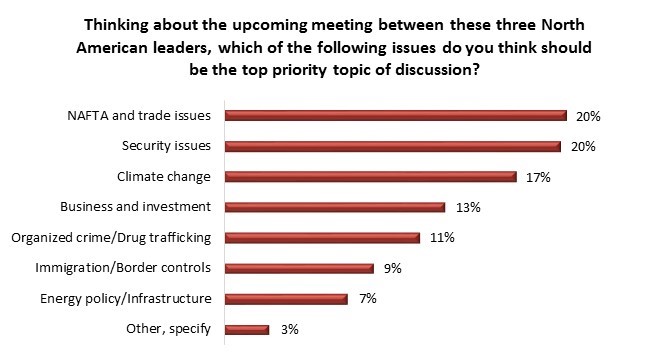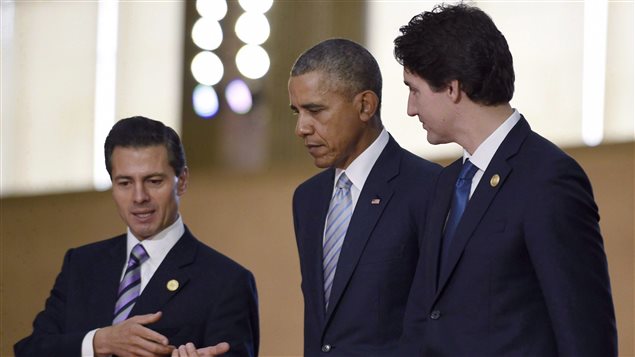Only one in four Canadians say the North American Free Trade Agreement (NAFTA) is good for their country, and more than one-third want it renegotiated, according to a public opinion survey released ahead of a North American leaders’ Summit on Wednesday.
“That’s notable and it’s surprising because it stands in contrast to our general view about trade,” said Shachi Kurl, executive director of Angus Reid Institute, which released the results of the opinion poll on Monday. “In this country if you ask Canadians, what should the top foreign affairs priority be, what should our top foreign policy priority be, it is pursuing trade agreements over and above military involvement or over and above foreign aid.”
(click to listen the interview with Shachi Kurl)
ListenWhen the survey asked respondents about their views on the recently signed Comprehensive Economic and Trade Agreement (CETA) with the European Union or the Trans-Pacific Partnership trade agreement, in both cases Canadians cautiously embraced these free trade deals, Kurl said.
“Trade is generally seen as political winner and yet with NAFTA there seems to be a lot of rejection towards this particular agreement,” Kurl said.
Change of attitudes?
The bigger question is whether Canadians view NAFTA as a bad deal or is this the beginning of a more protectionist and less pro-trade period, Kurl said.

Courtesy of Angus Reid Institute
These protectionist sentiments also appear to be swelling in the United States, where voters at both ends of the political spectrum question the economic benefits of NAFTA, and in Europe, she said.
“Look at what happened last week in Britain with the Brexit vote,” Kurl said. “Yes, immigration was a strong part of the argument for those who chose to leave, but of course in rejecting the EU they also reject closer trade ties and closer economic ties.”
Beginning a conversation
The popular ambivalence with NAFTA appears to be in direct contrast to support the trade deal enjoys among the Canadian and business elites, Kurl said.
Either this dissonance speaks to the failure on the part of Canadian business and political elites to communicate adequately to Canadians the benefits of such trade agreements, and NAFTA in particular, or this requires these groups to think that increasingly they find themselves offside with Canadian public opinion, Kurl said.
Alex Lawrence, a spokesperson for the International Trade Minister Chrystia Freeland, said the government believes NAFTA is in the best interest of Canada, U.S. and Mexico and is focused on deepening that trading relationship.
Canada, the U.S., and Mexico traded US$1 trillion in 2015, generating nearly 27 per cent of the world’s GDP with almost 7 per cent of the world’s population, Lawrence wrote in an email.
“The benefits for Canadian middle class families are clear,” he wrote. ” Cooperation through NAFTA has created a North America where Canadian, American and Mexican companies do more than make and sell things to each other; now, our companies increasingly make things together.”
For example, over half of Canadian manufacturing exports to the U.S. are intermediate exports (such as parts and components).
“If you look at trade as a drawbridge, it’s not like Canadians want to blow up the bridge, or not like they want the sentries to pull it back up over the mote,” Kurl said. “But what they do want is to have a conversation as to whether or not having that bridge down is really benefiting them in their everyday life.”







For reasons beyond our control, and for an undetermined period of time, our comment section is now closed. However, our social networks remain open to your contributions.